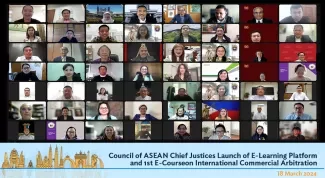ADB Develops New E-Learning Platform for ASEAN Judges to Enhance Judicial Education

In partnership with the Council of ASEAN Chief Justices (CACJ), ADB’s Law and Policy Reform Program launched the first-of-its-kind e-learning platform and e-learning module on international commercial arbitration.
Over 100 judges from ASEAN member states attended the event and discussed the evolution of judicial education, particularly in the era of technological advancements. E-learning is a critical tool to enable ASEAN judges to stay abreast of the latest developments in law and practice, providing increased flexibility and accessibility for increasingly busy workloads. Other e-modules are anticipated to be developed by different partners and hosted on the ADB-developed e-learning platform.
In today's connected world, business transactions often involve multiple jurisdictions. Stakeholders require a flexible, reliable, and efficient dispute resolution mechanism supported by a robust legal system. The judiciary plays a pivotal role in upholding international commercial arbitration.
Justice Rosmari Carandang, Former Associate Justice of the Supreme Court of the Philippines, and current Chancellor of the Philippine Judicial Academy (PHILJA)—the Philippine Supreme Court training school for justices, judges, court personnel, lawyers, and aspirants to judicial posts—delivered opening remarks at the launch. She said, "Considering the key role of courts in international arbitration, it is essential that arbitrators acquire an in-depth knowledge of dispute resolution. The courts have an essential role in increasing business confidence in a globalized community, contributing to post-pandemic economic recovery, and, more broadly, promoting sustainable development in the ASEAN region. This online, self-paced, on-demand course on international commercial arbitration, therefore, comes at a highly opportune time. We are deeply grateful to the Asian Development Bank for its commitment to strengthening judicial capacity with programs that are well aligned with our region's development needs. We are hopeful that with ADB support, ASEAN judiciaries can help create a legal environment that is conducive to economic growth."
Christina Pak, ADB Principal Counsel and Team Leader, Law and Policy Reform, who moderated the event, remarked, "ADB has been investing in judicial education for over ten years, and we have seen its evolution over time. We are privileged to partner with the CACJ working group on judicial education and training to launch CACJ's e-learning platform and the very first e-learning module."
Speaking about the benefits of e-learning and why judicial education is critical, Maria Cecilia T. Sicangco, Senior Legal Officer, Office of the General Counsel, said, "Judges with a deep understanding of arbitration not only facilitate faster dispute resolution but also contribute to an environment of business confidence, stability and fairness. These factors are essential for economic development and the rule of law. This course not only delves into core principles of international arbitration but also addresses emerging issues in technology, environment, and insolvency disputes. This ensures that judges are equipped to handle the most novel legal challenges arising from advances in AI, climate change, and financial crises.”
Justice I Gusti Agung Sumanatha, Justice of the Supreme Court, Indonesia, gave the closing remarks and embraced the opportunity for future e-learning modules to be added to the platform. He said, "I would like to express my highest appreciation to ADB through the ADB Technical Assistance: Strengthening Judicial Capacity Towards Sustainable Economic Development in Asia and the Pacific as an important partner of the Working Group Judicial Education Training for providing technical assistance in developing the electronic platform for ASEAN judiciaries and the development of the commercial arbitration module…This kind of platform is really needed."